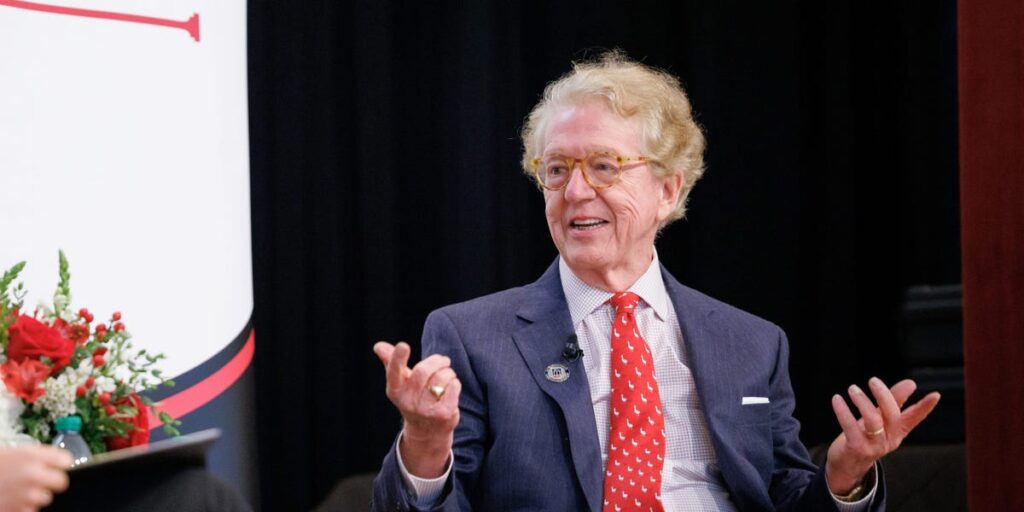- Dan Amos, the CEO of Aflac, shares his daily routine balancing global operations.
- Amos emphasizes the importance of work-life balance and being available 24/7.
- Aflac’s success is tied to strong ties with Japan, which makes up 70% of its business.
This as-told-to essay is based on a conversation with Dan Amos, the CEO of Aflac Incorporated, about his daily routine in Columbus, Georgia. It’s been edited for length and clarity.
I started my career at Aflac Incorporated as a sales representative in 1973 and spent 10 years in sales. I became the company’s top salesperson.
I eventually rose through the ranks to hold several leadership positions, including president in 1983, chief operating officer in 1987, chief executive in 1990, and chairman of the board in 2001. I’ve been the CEO for 35 years, which puts me among the top five current longest-serving Fortune 500 CEOs.
My primary role is listening to and connecting with people — customers, shareholders, institutions, the community, and my employees. Work-life balance is essential, but in my position, I have to be available around the clock.
Here’s what a typical day in my life looks like.
6:30 a.m. — My day starts early with calls to Japan
I’m up by 6:30 a.m. and have my first meeting with our team in Japan by 7 a.m. Due to the 13-hour or 14-hour time difference, we alternate holding calls early in the morning or late evening. Working with Japan, which accounts for 70% of our business, has taught me the value of listening and thorough preparation.
Our colleagues’ attention to detail has improved our decision-making process and strengthened our global operations, making these ties a cornerstone of our success.
7 a.m. — A quick breakfast and a short commute
After wrapping up my meeting, I grab a quick breakfast and drive to the office, which is just five minutes away.
By 7:30 a.m., I’m at my desk and ready for the day’s agenda.
7:30 a.m. — My office reflects our company’s global identity and values
My office has a few special things that mean a lot to me. Of course, there’s a special Aflac duck on my desk, a beautiful Japanese silk screen from the 1700s, and lots of family photos because that matters most.
8 a.m. — A doctor’s-office style to keep my door open for emergencies
While I have scheduled appointments, my direct reports can come upstairs to see me if unexpected issues arise. They may wait a little, but it won’t be long.
Once my meetings are over, I practice “management by wandering around.” I’ll drop in on team members and check on projects. I’ve found that it’s better to stay accessible and engaged but still give leaders the freedom to make decisions within the guardrails we’ve set.
12:30 p.m. — Lunch at my desk and the occasional Southern comfort food
I usually eat lunch in the office while catching up on the markets and reading business news.
Being a Southern boy, I grew up eating simple country food. Some days, I’ll go to a nearby restaurant called Country’s Barbecue. I’ve known the owner forever, and my favorite meal is their barbecue chicken.
Afternoon — Brand building and crisis management
The slowest part of my day is usually between 12 p.m. and 4 p.m., after my calls and morning meetings. This is when I work on strategy and big-picture issues that drive the company.
Over my 35 years as CEO, the biggest change has been how quickly I respond to issues, thanks to how fast-paced life has become with modern technology.
My dad told me a long time ago that you earn your money not on a day-to-day basis but on special days when you have major issues. When things happen, the most important thing is to act quickly and not panic.
For example, when Gilbert Gottfried, the former voice of our Aflac duck, made inappropriate comments about the tsunami in Japan in 2011, I had to act fast. Within 30 minutes, we pulled all his commercials in the US and terminated his contract.
6 p.m. — Wrapping up and spending quality time at home with my wife, Kathelen
I leave the office by 6 p.m. to have dinner and spend quality time with my wife. While I occasionally work in the evenings, I’m fortunate to have a supportive wife who understands when work calls.
Before videoconferencing and mobile phones, I traveled to Japan every other month and stayed late at the office daily.
Now, my schedule is more structured — I have weekly Sunday night calls to start Japan’s workweek, travel there four times a year, and take calls around 8 p.m. every other night unless there’s an emergency. This setup lets me be effective at work so I can focus on creating more meaningful moments with family.
Midnight — bedtime
After a long day, I unwind by watching TV but usually fall asleep in my chair around midnight.
Read the full article here
















